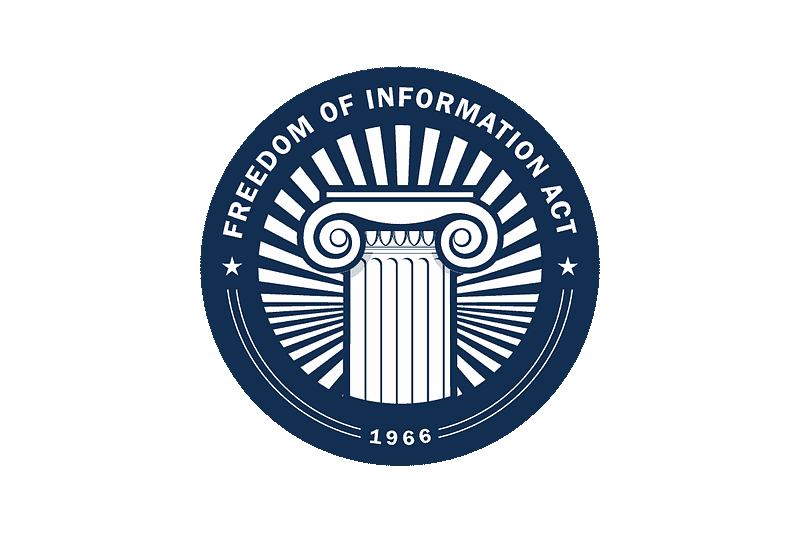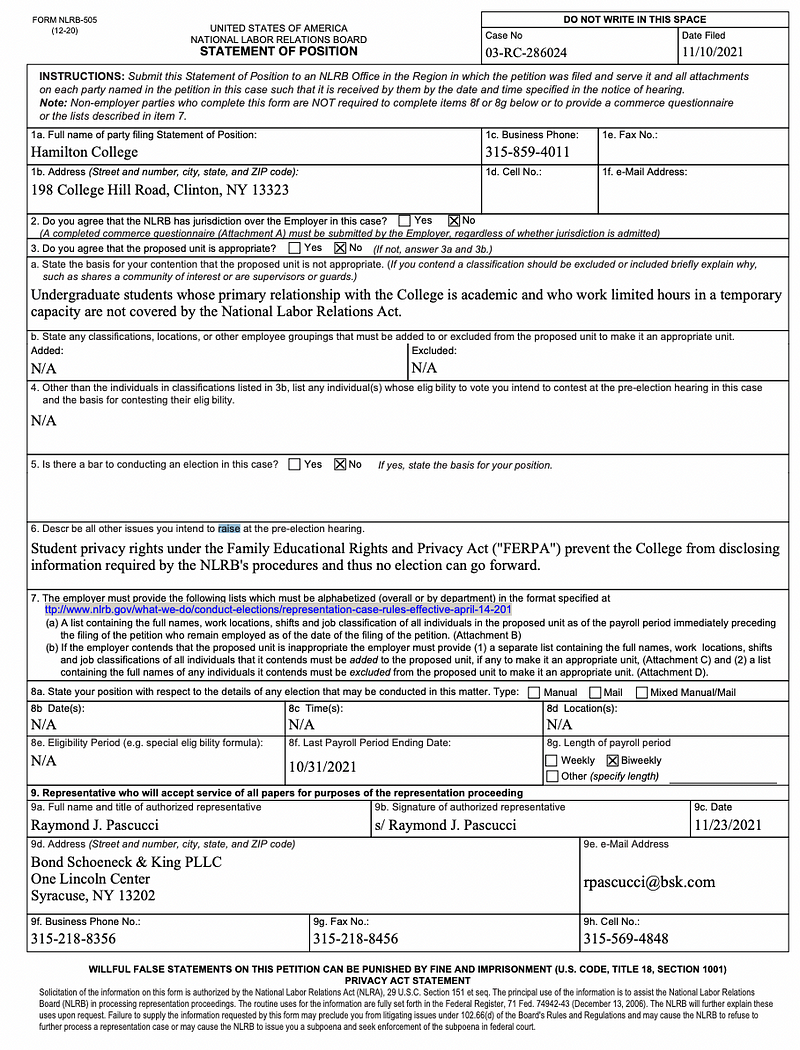
The Spectator
filed a Freedom of Information Act (FOIA) request with the the National Labor Relations Board (NLRB). In the NLRB’s 160 page document, The Spectator found that after Residential Advisors (RAs) and Days-Massolo Center (DMC) workers filed for unionization in Fall 2021, Hamilton disputed their legal right to unionize in official statements. Photo courtesy of Treeno Software.
After Residential Advisors (RAs) and Days-Massolo Center (DMC) workers filed for unionization in Fall 2021, Hamilton disputed their legal right to unionize in official statements, newly released documents from the National Labor Relations Board (NLRB) reveal. The batch of documents, totalling 160 pages, was made public last week after
The Spectator
filed a Freedom of Information Act (FOIA) request with the NLRB.
In both the RAs and DMC workers’ cases, Hamilton’s lawyer Raymond Pascucci employed the same arguments for why it was inappropriate for student workers to unionize and why the NLRB has no jurisdiction over these student workers. In their official “Statement of Position” on the unionization efforts, Pascucci argued that “undergraduate students whose primary relationship with the College is academic and who work limited hours in a temporary capacity are not covered by the National Labor Relations Act.” Further, the school argued that “student privacy rights under the Family Educational Rights and Privacy Act (“FERPA”) prevent the College from disclosing information required by the NLRB’s procedures and thus no election can go forward.”
“It’s union-busting 101,” said Eric Cortes-Kopp ’22, a member of the United Food and Commercial Workers (UFCW) organizing committee. “It’s a common tactic for employers to say they don’t agree with the [bargaining] unit even if it’s totally fine…This is just a stalling tactic.” Pascucci, of the law firm Bond, Shoenk, and King, declined to comment.
In an emailed comment to
The Spectator
, Dean of Students Terry Martinez said “following the union election involving students working in admissions, Hamilton took note of the fact that issues concerning the status of undergraduate students doing part-time work and student privacy concerns under FERPA have been raised by other parties in litigation in other jurisdictions and are currently pending before the NLRB. These issues involve conflicting interests under federal law that need to be reconciled.”
Dean Martinez refuted Cortes-Kopp’s claims about stalling the union election, saying “Hamilton College has not sought to delay or deny anyone their rights under law, but instead wants to insure that everyone’s rights are considered and protected to the greatest extent possible as determined by the NLRB and/or the courts.”
Pascucci filed this official statement on Nov. 10, 2021, less than a month after student admissions workers, another group of students who work part-time in a temporary capacity and are protected by FERPA, had their union election certified by the NLRB. Pascucci employed these arguments for RAs and DMC workers on behalf of the College, even after the NLRB had affirmed admissions workers’ right to unionize just weeks earlier.
Hamilton’s official position in regard to RAs and DMC workers as laid out in this statement of position also contradicts an earlier statement that Hamilton published after admissions workers voted to unionize. This statement says, in part, “Hamilton supports the right of workers to choose what they believe is best for them.”
Lawyers for the UFCW, the union looking to represent RAs and DMC workers, refuted Hamilton’s arguments in their own position statements, also a part of the released documents. The lawyers presented evidence of other unionization efforts at American universities and argued that DMC workers and RAs do indeed fall within the jurisdiction of the National Labor Relations Act so should be able to unionize. These lawyers resoundingly stated in their response statements that despite Pascucci’s allegations “that the proposed [bargaining] unit is not appropriate,” DMC workers and RA’s “are employees of a particular employer,” and therefore have a legal right to organize just like any other employee.
RA’s and DMC workers eventually withdrew their unionization petitions on Dec. 2, the same day that the NLRB had scheduled a hearing to determine if RAs and DMC workers were eligible for unionization. Cortes-Kopp told
The Spectator
that they withdrew the unionization petition because students did not want to have both the hearing and the final election so close to final exams.
As of April 6, neither RAs nor DMC workers have refiled for unionization. Cortes-Kopp declined to say why they had not yet refiled for unionization but said “admissions’ [workers unionizing] was not just a one-off.”
All of the documents can be viewed and downloaded at this link:
NLRB-2022–000168RequestDetails
The Spectator submitted a FOIA on 11/14/2021. The final disposition was a partial grant/partial denial.
foiaonline.gov

















